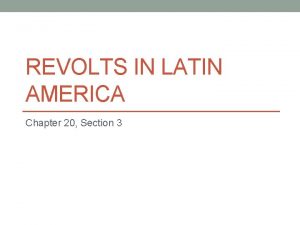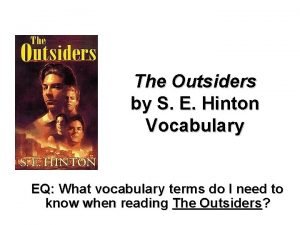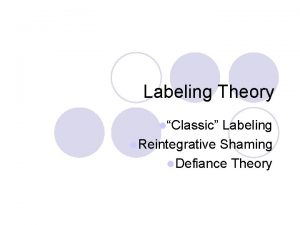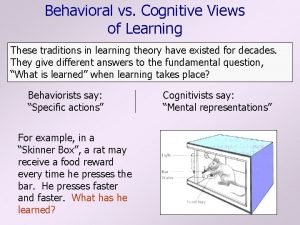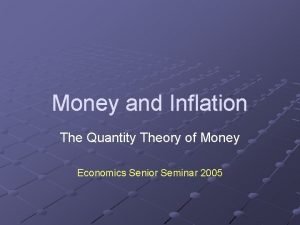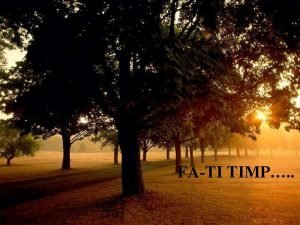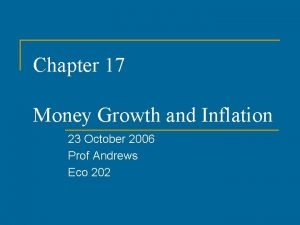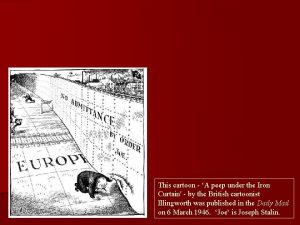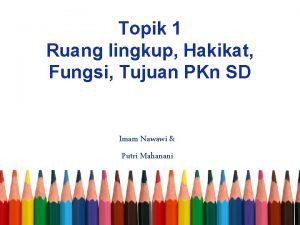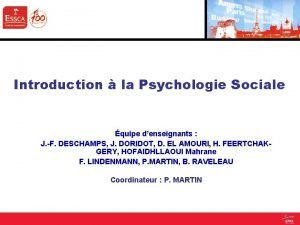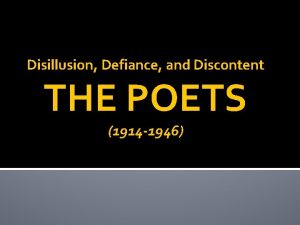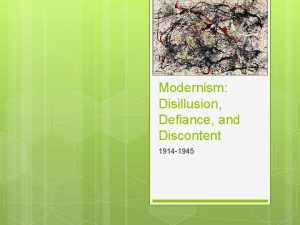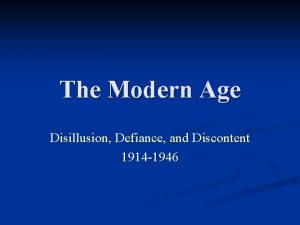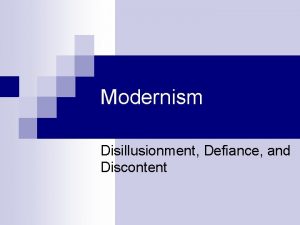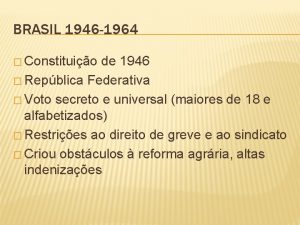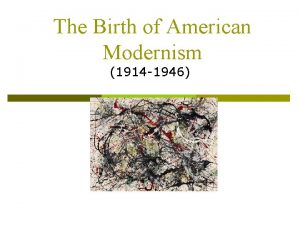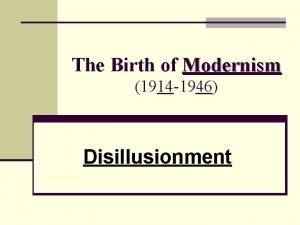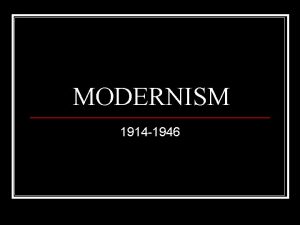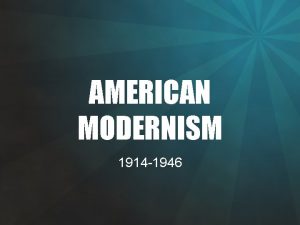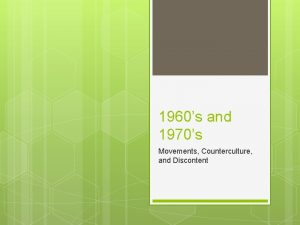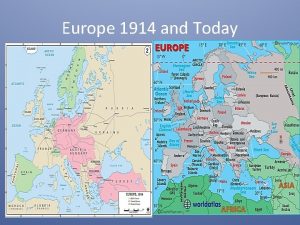Disillusion Defiance and Discontent 1914 1946 Disillusion Defiance




















- Slides: 20

Disillusion, Defiance, and Discontent 1914 -1946

Disillusion, Defiance, & Discontent America achieving world dominance while simultaneously losing its youthful innocence & brash confidence � Historical Background � World War I in Europe – U. S. wanted to remain neutral, but it became impossible after German U-boat sank Lusitania carrying 128 Americans � Many famous American writers witnessed war firsthand, serving as ambulance drivers, infantrymen (Cummings, Hemingway, Dos Passos) � Prosperity � Failure & Depression to join League of Nations, Prohibition, Gangs � Economy boomed immediately after war before implosion, leading to Great Depression

Disillusion, Defiance, & Discontent � World War II � German invasion of Poland sparked second World War 20 years after the first ended � Americans wanted to remain neutral but once Japan attacked Pearl Harbor, U. S. had to enter war � Atomic Bombs dropped in Japan brought peace

Disillusion, Defiance, & Discontent Literature of the Period � The Birth of Modernism � Modernists … � Experimented with a wide variety of new approaches & techniques, producing diverse body of literature � Shared a common purpose – capture the essence of modern life in both the form & content of the work � Constructed work out of fragments, omitting the expositions, transitions, resolutions, & explanations used in traditional literature � Themes usually implied rather than directly stated, creating sense of uncertainty & forcing readers to draw their own conclusions

Disillusion, Defiance, & Discontent � Imagism � Poetic movement (1909 -1917) � Rebelled against sentimentality of 19 th century poets � Demanded hard, clear expression, concrete images, & language of everyday speech � Expatriates � Number of American writers became expatriates or exiles following the wars � Many settled in Paris – Gertrude Stein coined phrase “lost generation” to describe those disillusioned by WWI � Most in “lost generation” saw little in civilization to praise or accept

Disillusion, Defiance, & Discontent � New Approaches � Writers explored new literary territories � Stream-of-consciousness to re-create natural flow of a character’s thoughts � Sought to find meaning in American sights & sounds and used informal, conversational speech � Shifting focus between reality & fictions that imagination creates � The Harlem Renaissance � African-American writers newly arrived from the South were creating renaissance � Burst of creative activity by African-American writers

Facing Troubled Times � T. S. Eliot (1888 -1965) � Work revolutionary in form & content � Techniques included intentionally fragmented structure � Focused on frustration, despair of modern urban life in a rapidly changing society � Modernist – wanted to reflect genuine, fractured experience of life by exploring uncertainty of modern life

T. S. Eliot � Literary Terms � Dramatic Monologue – a poem or speech in which a character addresses a silent listener � Used in The Love Song of J. Alfred Prufrock as an unidentified companion – possibly part of his own personality – to walk with him as he reflects about his bitter realization that life and love are passing him by � Allusion – References to books, movies, people, historical events, etc. that would be commonly known � Helps paint a picture of Prufrock and his culture

T. S. Eliot �Epigraph translation (from Dante’s Infero) If I believed my answer were being given to someone who could ever return to the world, this flame (his voice) would shake no more. But since no one has ever returned alive from this depth, if what I hear is true, I will answer you without fear of disgrace.

F. Scott Fitzgerald � Captured Roaring Twenties like no other writer � Many Americans lived with reckless abandon, attending wild parties, wearing glamorous clothing, & striving for fulfillment through material wealth � Quest for pleasure often accompanied by inner despair � These two ideas led to a paradox, which Fitzgerald wrote about effectively, mainly because he lived it

F. Scott Fitzgerald �Literary Terms � Characterization – Revelation of characters’ personalities � Direct Characterization – writer tells the reader what the character is like � Indirect Characterization – characters’ traits are revealed through their thoughts, actions, and words, and by what other characters say to or about them � Characters’ Motivations – characters’ reasons for acting as they do � May come from internal sources, such as feelings of loneliness, or external sources, such as danger

Winter Dreams � Characterization � Dexter Green � Directly or Indirectly characterized � What clues reveal to readers the method of characterization? � Judy Jones � Directly or Indirectly characterized � What clues reveal to readers the method of characterization?

Winter Dreams � Are Dexter Green’s motivations internal or external? How do readers know (What evidence does Fitzgerald provide? ) � Are Judy Jones’ motivations internal or external? How do readers know (What evidence does Fitzgerald provide? )

Thomas Wolfe � Driven by desire to experience all life had to offer, Wolfe pursued variety Large, eccentric family served as models for his fiction � Criticized for basing his work too closely to his own life, Wolfe became obsessed with duty as writer to act as a social historian, interpreting his time & place � � Novels displayed strong sense of time & place, an ability to create vivid & realistic descriptions, and a deep understanding of the human condition

Thomas Wolfe � Literary Terms � Climax – high point of interest & moment at which the conflict is resolved � When the resolution is unexpectedly disappointing, ridiculous, or trivial, it is called an anticlimax �Anticlimax is more a low point than high point �Reader has been led to expect something important or serious is about to occur, but is suddenly confronted with a letdown of a seemingly inappropriate resolution �Can create a variety of effects – pathos, humor, etc. � Rising action – events leading up to the climax that build a reader’s interest

Ernest Hemingway � Literature expressed sentiments of many members of post-WWI generation – people’s struggles to maintain a sense of dignity while living in a sometimes hostile world � As ambulance driver in Italy during WWI, his experiences helped shape his view of the world & provided material for his writing � Expat in Paris, literary friends helped him develop concrete, concise & highly charged writing style

Ernest Hemingway � Literary � Terms Point of View �First-Person Point of View – person telling the story participates in the action, uses the pronoun I, and share his or her own thoughts & feelings about events �Limited Third-Person Point of View – story told by anonymous speaker who stands outside action and does not use the pronoun I. Speaker both relates events of story and conveys thoughts of one of the characters �Narrator controls information and directly influences reader’s perceptions

Another Country � Written in first-person point of view � Why? � Captures the ideas of someone who experienced the devastation World War I caused to the individual � Illustrates idea of man’s struggle to maintain his dignity in a harsh world � Allows readers to experience the world in the same way that the narrator has experienced it � What does the narrator mean by the line “He had lived a very long time with death and was a little detached. We were all a little detached, and there was nothing that held us together except that we met every afternoon at the hospital. ” � Do the hospital visits allow the soldiers to maintain their dignity? How?

Another Country � The Narrator shows the Italian children his medals � They admire the medals � He remains an outsider because he was “never really one of them” � He didn’t earn his medals in the same way – wounded by accident � Two ways each was alike: Each was afraid to die, each was wounded in some way, each maintaining their dignity � How does man maintain his dignity? � In whatever ways he knows how, if he can at all � How does the major demonstrate this?

William Faukner � Birthplace became imaginary world (Yoknapatawpha County) that was setting for many of his novels & stories � Home became a gold mine of inspiration for his writing – compelling & complex � Wrote about decay of traditional values as small communities became swept up in changes of the modern age � Used dialect to highlight these ideas
 Discontent in latin america worksheet answers
Discontent in latin america worksheet answers Gallantly definition in the outsiders
Gallantly definition in the outsiders Sherman defiance theory
Sherman defiance theory Fort defiance ihs
Fort defiance ihs Defiance vocabulary
Defiance vocabulary Tolman ritchie and kalish (1946)
Tolman ritchie and kalish (1946) Hungary inflation rate 1946
Hungary inflation rate 1946 Romania in perioada razboiului rece ppt
Romania in perioada razboiului rece ppt Hungary inflation rate 1946
Hungary inflation rate 1946 Dasar cheeseman 1946 wikipedia
Dasar cheeseman 1946 wikipedia Maksud berkerajaan sendiri
Maksud berkerajaan sendiri Lbb 1950/10
Lbb 1950/10 Nueva resurrección david alfaro siqueiros
Nueva resurrección david alfaro siqueiros Gpogo
Gpogo Iron curtain political cartoon meaning
Iron curtain political cartoon meaning Dator 1946
Dator 1946 Carta da paz social
Carta da paz social 1980-1946
1980-1946 Kurikulum 1946, kurikulum 1957, dan kurikulum 1961
Kurikulum 1946, kurikulum 1957, dan kurikulum 1961 Iso 1946
Iso 1946 Expérience de asch 1946
Expérience de asch 1946
